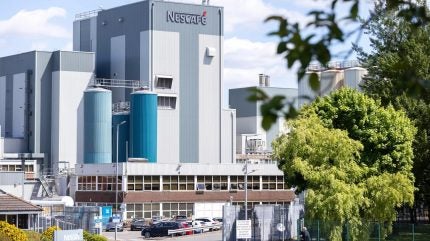
Nestlé is investing in production and packing at a coffee plant in north-west England.
The site in Dalston in Cumbria, is getting a cash injection of £28m ($36.7m) to build a new mixing plant and install two packing lines for the Nescafé Frothy Coffee instant beverage range.

Discover B2B Marketing That Performs
Combine business intelligence and editorial excellence to reach engaged professionals across 36 leading media platforms.
Expansion work at the plant is due to be completed by February next year, the group confirmed to Just Drinks.
Nestlé said in a statement that the new mixing plant will account for £17.5m of the investment, incorporating the “latest equipment and design standards”.
The four-storey facility will include a new system designed to handle ingredients in larger bags, which will cut heavy lifting by 80%.
Meanwhile, the additional packing lines will be capable of producing up to 60,000 frothy coffee sachets per hour. Costing £10.7m, they will replace older equipment.

US Tariffs are shifting - will you react or anticipate?
Don’t let policy changes catch you off guard. Stay proactive with real-time data and expert analysis.
By GlobalDataThey will also be able to use new packaging materials, including Mono PP laminate, making the sachets “fully recyclable”, Nestlé said.
Mono PP laminate is a flexible packaging material made from polypropylene and is reportedly able to increase recyclability.
Operating since 1962, Nestlé said the Cumbria plant is recognised as a global “centre of excellence” for frothy coffee production. Some 339 people are employed at the facility.
The site also manufactures Nescafé Cappuccino and Latte, Coffee Mate, and the Starbucks range of Latte products.
Richard Watson, CEO of Nestlé’s UK & Ireland division, said: “The Dalston investment is a prime example of how we’re investing in the future of the British food and drink industry – modernising our operations and supporting local jobs, driving growth opportunities and being more sustainable.”
In the first nine months of 2025, Nestlé reported total sales of SFr65.9bn ($82.1bn), with powdered and liquid beverages, including coffee, along with confectionery, being the “largest” organic growth contributors of 7.5% and 8%, respectively.
“This growth was pricing-led, with double-digit increases in some markets,” Nestlé said in its results statement, singling out coffee and confections.
Powdered and liquid beverages, which includes the brands Nescafé, Nespresso and Milo, delivered sales of SFr18.4bn.





